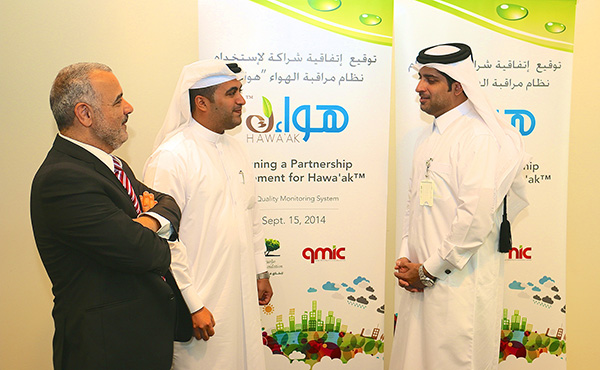
Qatar Foundation Selects QMIC’s Hawa’ak™ Environment Monitoring System for Education City Deployment Following Successful Two-Year Pilot Programme
Monday 15 September, 2014
Qatar Foundation for Education, Science and Community Development (QF) has selected the Hawa’ak Environment Monitoring System from the Qatar Mobility Innovations Center (QMIC) as part of QF’s vision to realize a smart environmentally friendly campus at Education City.
The agreement, following a successful two-year pilot programme, was finalized with a contract signing ceremony held today at QMIC’s office at the Qatar Science & Technology Park (QSTP), attended by senior representatives from both parties.
Hawa’ak is an air quality monitoring system that utilises a rich Internet of Things (IoT) platform, fully developed by QMIC to support real-time monitoring of air quality and other environmental conditions, and also allows users to access the information via multiple channels including mobiles and web portals.
Hawa’ak utilises a new generation of mobile sensor stations, allowing the delivery of localised and personalised air quality information. This information contributes to building a rich bank of data and is driving the creation of new services and applications optimized for enterprises, government agencies, and consumers.
The monitoring stations will be located across main areas of Education City to provide a comprehensive overview of the environment and air quality conditions onsite. Information will be accessible for all Qatar Foundation staff and students through QF’s internal Maktabi web portal.
Ms. Amal Al-Thani, Executive Director of QF’s Health, Safety, Security & Environment Directorate (HSSE) which is responsible for the project, said: “Deploying the innovative Hawa’ak system and applications represents a critical element of our strategy to create a smart environmentally friendly campus and culminates our joint effort in piloting the system in the last 2 years.
“This deployment will allow us to deliver necessary timely information to our users and stakeholders. In addition, the Hawa’ak system will allow us to create a rich data bank, which can be useful for conducting research and data analysis. We, at Qatar Foundation, are proud to be collaborating with a national entity like QMIC for deploying this system.”
Dr. Adnan Abu-Dayya, Executive Director (CEO) of QMIC said: “This agreement is a milestone for QMIC as it represents the first full deployment of our intelligent Hawa’ak system. We have enjoyed our working relationship with the HSSE team at Qatar Foundation throughout the pilot stage of this deployment and we look forward to the next stage of this partnership. Hawa’ak™ is yet another intelligent system resulting from QMIC’s local R&D effort and clearly demonstrates our significant progress in transitioning locally engineered innovations from the lab to the market place”.
This contract is the result of a successful two-year pilot with HSSE that was announced in April 2012 at Education City. The pilot proved to be technically and operational successful in meeting the emerging needs of the HSSE team. As part of the new contractual agreement, a dedicated Hawa’ak network that consists of a number of air quality monitoring stations and particulate matters (PM2.5) monitoring stations will be fully deployed at Education City. The distributed monitoring stations will measure the levels of O3, NO2, NO, CO, PM 2.5, and some of metrological parameters (temperature, relative humidity, and wind speed & direction).
QMIC’s Hawa’ak system is growing rapidly to deliver other needed services besides the air quality monitoring. For instance, Hawa’ak is currently capable of monitoring the electro-magnetic field radiation caused by cellular wireless towers and indoor wifi access points, and soon Hawa’ak will support the deployment of advanced weather stations and collection of detailed weather-related data as well.
Qatar Foundation – Unlocking Human Potential
Qatar Foundation for Education, Science, and Community Development (QF) is a private, non-profit organization that is supporting Qatar on its journey from a carbon economy to knowledge economy by unlocking human potential, for the benefit of not only Qatar, but the world. Founded in 1995 by His Highness Sheikh Hamad bin Khalifa Al Thani, the Father Emir, QF is chaired by Her Highness Sheikha Moza bint Nasser. QF’s work encompasses education, research and community development. World-class universities are brought to Qatar to help create an education sector in which young people can develop the attitudes and skills required for a knowledge economy. At the same time, QF builds Qatar’s innovation and technology capacity by developing and commercialising solutions through key sciences. The Foundationalso works to foster a progressive society while enhancing cultural life, protecting Qatar’s heritage and addressing immediate social needs in the community.
About QMIC:
The Qatar Mobility Innovations Center (QMIC), located at the Qatar Science and Technology Park (QSTP), is the first independent regional innovations center that was created to leverage the use of emerging mobility technologies and lifestyle in developing and deploying intelligent solutions and smart applications for use in a number of markets including Transportation, Road Safety, Environment, and Smart City Platforms. QMIC was founded with the objective of filling the existing gap in the region for institutions focusing on applied research and solutions delivery with the aim of creating local knowledge-based ventures.
For further information please contact:
[email protected], +974 44592702